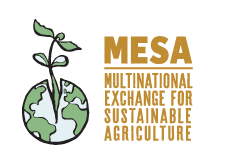This is part two of the blog interview with MESA Steward Isabel Quiroz and her work linking women, gardening, and community change. Read part one and learn more here.
Isabel worked with Gaia Soluciones and the municipality to launch a violence-reduction initiative in some of the most marginalized neighborhoods of Aguascalientes. The initiative saw community gardens as a powerful tool to address the complex, root issues of violence.
We sent Isabel a note asking what changes she has witnessed among the women in these gardens. She shared a story about Judith:
Judith Bolaños joined the community garden over a year and a half ago. Through the project, she says the garden has changed her relationships with the neighbors. Although she had lived for several years in the area, until the garden, she had not built good relations with almost anybody.
Judith notices that she herself has changed and grown. Once introverted and with difficulties expressing herself, the garden activities gave her the space to be more confident. This confidence translated into her home life as she has better relationships with her children and husband. Now, her mother and sons are also involved in the garden and consider it as an extension of their homes (the houses they live in are really, really small). The garden helps the family on an emotional level.
Economically speaking, the garden helps them to have a better quality life. A big part of their budgets goes to food. The alimentation of Judith’s family also changed. Everyone is more conscious of what they eat and where it is from. She and almost all the ladies of the community garden have lost weight (let’s remember that according to the WHO México is the 2nd country in the world leading in obesity!). And they can now have access to traditional herbal medicine.
Judith tells me that the garden as a space reinforces peace in the community. The space where the garden is now once was an empty plot where young people used to go to get high. Now, little children can go to learn how to garden, respect and value other living creatures. Judith enjoys working with little children and several kinder programs have been invited to receive classes and workshops.
The garden is now focal point for a community that now wants to learn how to grow their own food. After two years, this group is not only taking care of the garden but are joining with the government to teach others how to grow their own food.
I see this as an example of true empowerment. Judith now considers herself as an environmental leader. The women keep educating themselves, taking courses and offering them back to the community. They are part of the social and environmental movement in Aguascalientes.
